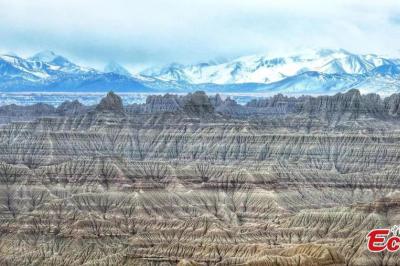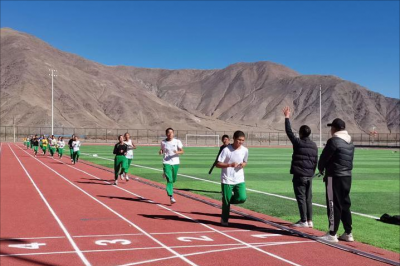| June 20, 2016 -- Natives of Lhokha prefecture in the Tibet autonomous region are hoping its elevation to city status will bring with it more tourists and be a boon to the local economy.
Lhokha was raised to its current status by the State Council in January, and the elevation ceremony was held on May 27 - making it the fifth prefecture-level city in the region.
Khedrub, a member of the National Committee of the Chinese People's Political Consultative Conference who serves as vice-chairman of Lhokha's CPPCC committee, said the new city's proximity to the administrative capital of Lhasa would only help it to grow.
"Its economics, transportation, education, and culture are all ranked at the forefront of the region's prefectures," said the 58-year-old, adding that with this move Lhokha "will get more chances to propose projects to higher governments" and will be able to "provide more job opportunities to local residents".
As a city, Lhokha will also be granted greater autonomy over its own affairs and have the right to make its own bylaws, Khedrub said, which will simplify approval processes and result in better work efficiency.
"Many local residents will also be able to find jobs on construction sites such as the Lhasa-Nyingchi Railway, which will cut through the city, as well as road and bridge projects," Khedrub said.
Other tourism projects, including new restaurants, guesthouses and shops, are expected to provide jobs and generate income.
"I hope the elevation of the city will bring more tourists to our hometown, and I hope it will increase my income," said Dobgyal, a 49-year-old stall owner in Lhokha.
Palden Nyima
Khedrub said the new prefecture-level city government would be able to push ahead with infrastructure construction projects at Lhokha's many cultural and religious sites, "which will attract more tourists in the future".
Wang Youhua, a member of the Lhokha City Committee, said under the old arrangements, the government had no local legislative authority and was hindered in carrying out its executive functions, which in turn affected the prefecture's economic development.
Zhou Yong, an associate professor and doctor of economics at the Social Economical Strategy Institute of the Tibet Academy of Social Sciences, said Lhokha being upgraded to city status was a good news for all.
"A city means a concentration of residents, it has more authority to make it own decisions, and it is a new starting point," Zhou said.
Located at an average altitude of 3,700 meters, Lhokha is known as the birthplace of Tibetan culture and is home to many firsts, such as Tibet's first palace, first monastery, first castle and first village.
By: Palden Nyima
|
- Home
- News Tibet |Exclusive |China |World |Related News |Latest
- Documents White Papers |Others
- Photo Politics |Economy & Society |Culture & Religion |Human & Nature |Beautiful Tibet |Other Tibetan-Inhabited Area |Exchanges |Related
- Video News |Documentary |Micro-Video |Entertainment
- Art
- Tourism
- In Focus
- About Tibet






